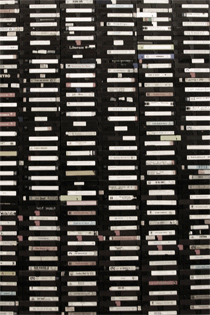Zepf, Marcus et Lauren Andres. 2011. Enjeux de la planification territoriale en Europe. Lausanne : Presses polytechniques et universitaires romandes.
Guy Baudelle | 17.03.2014
Spatial planning seemed to be out of fashion but this very stimulating overview, based on case studies that focus on various European countries, shows that the deep transformation of territorial planning has allowed its unexpected resurgence. The book intends to show that this dramatic change has been driven by the need for more flexibility and coherence. Foresight and spatial visioning illustrate some of the new instruments designed to face contemporary challenges. But the dissemination channels of these new practices [...]
An unconventional notion of social space for research on social topics.
Klaus Geiselhart | 10.03.2014
This article carries the constructivist idea to its logical conclusion. If space is always perceived in three dimensions and does not have a substance, why not consider social topics in the the same way and see whether this produces informative and new insights ? The notion of Euclidean space as a dimensional system of ordering is an elementary concept in social sciences. This article gives two examples of how this concept could be employed in a non-positivistic and non-essentialist [...]
Kurgan, Laura. 2013. Close up at a distance. Mapping, technology and politics. New York : Zone Books.
Jean-Christophe Plantin | 10.03.2014
With her book Close up at a distance. Mapping, technology and politics, Laura Kurgan, Professor of architecture at Columbia University in New York city, interrogates the political, technical and ethical debates around satellite imagery, GPS and Geographic Information Systems. The originality of Kurgan’s work comes from her theoretical articles, that use geography and sciences, technology and society resources, and the presentation of nine artistic projects that she has been working on for twenty years, using case studies of satellite [...]
Pablo Jensen | 03.03.2014
Physicists can be annoying when they attack social systems. For example, when one of them learnedly explains in Le Monde the very close result of several elections from the early 2000s using elegant mathematical models… which are completely unrealistic. Or again when one of the most visible “socio-physicists” affirmed in 2007 in the prestigious English [...]
Michael Bauder, Tim Freytag et Maie Gérardot | 17.02.2014
This article presents a series of the findings from a combined visitor survey and GPS tracking study that was conducted in May and June 2013 in Paris. The mobility of the 129 participants in this study is characterized by a high degree of spatial concentration at several major tourist attractions. Moreover, the most important axes of tourism mobility in Paris are identified. [...]
François Legouy | 17.02.2014
Geohistory of the French wine area (1808-2010) highlights, for the whole of the French territory, two cycles of growth and decline of vineyards. We can observe a period of wine transition (“transition vitivinicole”) during the second cycle, which is in fact divided into two phases : the first one represents the decline of wine surfaces, especially those producing wines of regular consumption. The second phase consists in the mix of two trends : the confirmed decrease of areas producing [...]
Valérie Kociemba | 10.02.2014
Fiction films and television series shot in the Bordeaux area are the corpus of study of this article. Their study provides a crossing of the urban area rooted in history. The tradition of shooting in Bordeaux is a player in the local economic dynamics. Through fiction, the geographer observes a recomposition of urban transects which highlights the identity elements of the city. These elements contribute to give the town its heritage and its roots in history, its bourgeois character [...]
Eduardo Camacho-Hübner | 10.02.2014
Mobility issues do not only involve the act of moving nowadays. The concept itself evolves continuously thanks to technological and social innovations. The main stakes do not focus anymore on improving speed, but on enriching the experience of travelling, even in the case of short trips. One of the main factors that fosters this evolution is the progressive adoption of information and communication technologies that help to reshape the issues of contemporary cities. For example, the quality of travel [...]
Eddy Banaré | 07.02.2014
In New Caledonia, the abrogation of the “Décret d’Indigénat” in 1946 marked the beginning of the politicization of the Kanak community. Some Kanak leaders, albeit briefly, joined the Communist Party in 1947. However, the effects of this politicization only started to become visible once the first generation of Kanak students came to France in order to complete their studies at French universities. The main objective of this article is to analyze how Frantz Fanon’s thoughts influenced early Kanak emancipatory [...]
Régis Meyran | 27.01.2014
The purpose of the present contribution is to provide a way of thinking the wide category of urban musics (including hip-hop, slam, electro and improvised music). Several ethnographic observations have lead the author to the idea that the musical practices and inherent speeches are used by the artists to subvert western aesthetic codes by deconstructing several structural oppositions (such as scholar/popular, imitation/creation, singing/talking...). Moreover, the groups that are socially dominated use these musical technics as a tool for affirming [...]

